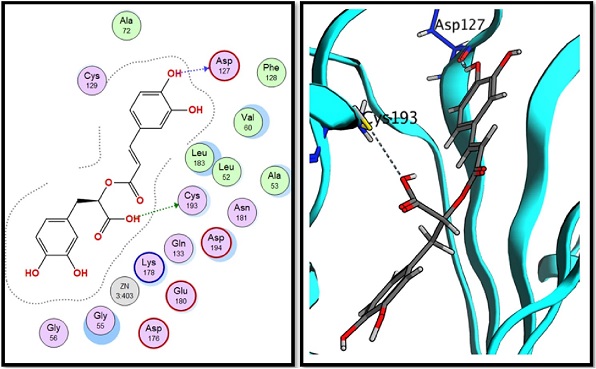COVID-19 News: The Phytochemicals Tannic Acid And Rosmarinic Acid Are Able To Target The Main Protease And AAK1 In SARS COV-2
Nikhil Prasad Fact checked by:Thailand Medical News Team Nov 05, 2023 2 years, 3 months, 1 week, 2 days, 4 hours, 58 minutes ago
COVID-19 News: The ongoing COVID-19 pandemic, caused by the severe acute respiratory syndrome coronavirus 2 (SARS-CoV-2), has presented a significant global health challenge for over two years. Researchers worldwide have been tirelessly working to identify effective treatments and therapies to combat the spread of this virus. Amid these efforts, natural compounds, such as phenolic acids which are phytochemicals procured from various plants, have emerged as potential candidates in the fight against SARS-CoV-2. In a recent study covered in this
COVID-19 News report that was conducted by scientists from King Khalid University and King Saud University in Saudi Arabia, Taif University in Saudi Arabia, Cairo University in Egypt, and Tanta University in Egypt, in which the researchers explored the inhibitory potential of a range of natural phenolic acids against SARS-CoV-2.
.jpg)
Phenolic acids are a group of secondary metabolites found in various plants, including fruits, vegetables, spices, and herbs. These compounds are known for their diverse health benefits, including antioxidant, anti-inflammatory, anticancer, anti-allergic, antihypertensive, and antiviral properties. Given their potential antiviral capabilities, researchers have been investigating phenolic acids as a possible defense against human viruses, including the coronavirus responsible for the COVID-19 pandemic.
SARS-CoV-2, like many other viruses, relies on specific proteins and enzymes to carry out its life cycle within the host's cells. These proteins represent attractive targets for drug development, and among them, two important targets are the main protease (Mpro) and adaptor-associated protein kinase 1 (AAK1). Mpro plays a crucial role in processing viral polyproteins and is an essential enzyme for viral replication. AAK1, on the other hand, is involved in endocytosis and cellular entry of SARS-CoV-2. Thus, inhibiting these two targets can potentially halt the virus's progression within the host.
The research conducted in this study aimed to evaluate the ability of a panel of natural phenolic acids to inhibit the virus by directly targeting Mpro and indirectly affecting AAK1. To achieve this goal, the researchers employed a variety of computational techniques, including pharmacophore mapping, molecular docking, molecular dynamics, and ADME (Absorption, Distribution, Metabolism, and Excretion) studies. These techniques allowed them to analyze the interactions between phenolic acids and the target proteins at the molecular level.
Pharmacophore mapping, an essential step in drug design, was used to identify the key chemical features required for binding with Mpro and AAK1. This process identified a set of natural phenolic acids that exhibited promising potential for inhibiting these enzymes.
Molecular docking studies were then conducted to quantify the binding energy of the selected phenolic acids to Mpro and AAK1. The results revealed that rosmarinic acid and 2,3-dihydroxybenzoic-5-O-glucoside displayed the highest binding affinities against Mpro, with binding energies of -16.33 kcal/mol and -12.28 kcal/mol, respectively. These values outperformed the binding energy of the co-crystallized ligand, indicating their strong potential as inhibitors. Similarl
y, for AAK1, tannic acid demonstrated the most favorable binding energy of -17.15 kcal/mol, showcasing its potential to inhibit this crucial target. This suggests that these phenolic acids could be utilized in a synergistic manner to disrupt the SARS-CoV-2 life cycle, preventing viral replication and cellular entry.
To further validate their findings, the researchers conducted molecular dynamics simulations, extending to 50 ns and 100 ns. This extensive analysis aimed to assess the stability of the phenolic acid-protein complexes over time and gain insight into their behavior within the binding pockets.
The simulations demonstrated that both rosmarinic acid and tannic acid maintained their stability throughout the experiment, indicating their potential as effective inhibitors. The root mean square deviation (RMSD), root mean square fluctuation (RMSF), radius of gyration (Rg), solvent-accessible surface area (SASA), and hydrogen bond analyses all supported the stability of these complexes, with low fluctuations and consistent properties throughout the simulations.
 2D and 3D interactions of rosmarinic acid in the AAK1 active site
2D and 3D interactions of rosmarinic acid in the AAK1 active site
Additionally, principal component analysis (PCA) was employed to explore the conformational distribution and large-scale collective motions of the protein-ligand complexes. It was evident that the Mpro-rosmarinic acid complex occupied a smaller phase space than the AAK1-tannic acid complex, indicating a more stable interaction.
To assess the bioavailability and toxicity of the selected compounds, an ADME study was conducted. The results showed that a few phenolic acid compounds had good gastrointestinal absorption, while tannic acid and rosmarinic acid exhibited high hydrophilicity, suggesting that structural modifications may be necessary to improve their bioavailability. Furthermore, all the tested compounds were found not to be substrates for permeability glycoprotein (PGP), indicating they are unlikely to be subject to cell efflux. Toxicity studies indicated that tannic acid and rosmarinic acid were non-carcinogenic and non-mutagenic in various models.
In conclusion, this study highlights the potential of natural phenolic acids, particularly rosmarinic acid and tannic acid, as promising candidates for the inhibition of SARS-CoV-2's main protease and adaptor-associated protein kinase 1. Their strong binding affinities, stability in complex formation, and low toxicity profiles make them attractive options for further preclinical and clinical research as potential treatments for COVID-19. It's important to note that while these findings are promising, additional research is needed to confirm their efficacy in vivo and their safety in human subjects. The pursuit of natural compounds as potential antiviral agents continues to be a crucial area of research in the battle against the ongoing COVID-19 pandemic.
The study findings were published in the peer reviewed journal: Scientific Reports.
https://www.nature.com/articles/s41598-023-34189-6
For the latest
COVID-19 News, keep on logging to Thailand Medical News.
.jpg)
